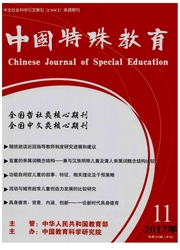

 中文摘要:
中文摘要:
选取匹配言语智力的孤独症儿童21名、智力迟滞儿童18名和典型发展儿童20名,考察他们对指向客体与指向自我及他人假装动作的理解,探讨假装理解的相关因素。要求儿童对实验者演示的3种动作(功能游戏、替代假装和想象假装)进行解释,并完成心理理论和抑制控制任务。结果表明,孤独症儿童对假装游戏的理解存在缺陷,儿童对指向自我的动作理解不能自发迁移至对指向他人的动作理解中,心理理论和抑制控制均能正向预测假装理解。
 英文摘要:
英文摘要:
The present study, by surveying 21 children with autism, 18 children with intellectual disabilities, and 20 children with typical developments, aims to examine their understanding of object-directed actions, self- directed actions and others' pretend actions, and explore the factors thereof. The children are required to explain three types of actions (the functional play with appropriate preps, the substitutional pretend play with mismatched preps, and the imaginary pretend play without any props) demonstrated by the experimenters, and then complete the tasks involving the theory of the mind and inhibition control. The results show the following: the children with autism find difficulty in understanding the pretend play; their understanding of self-directed actions cannot be shifted to that of others-directed actions; the theory of the mind and inhibition control can beth be used to positively predict their understanding of pretend play.
 同期刊论文项目
同期刊论文项目
 同项目期刊论文
同项目期刊论文
 Personality as a Predictor of General Health in Captive Golden Snub-Nosed Monkeys (Rhinopithecus rox
Personality as a Predictor of General Health in Captive Golden Snub-Nosed Monkeys (Rhinopithecus rox From the External to the Internal: Behavior Clarifications Facilitate Theory of Mind (ToM) Developme
From the External to the Internal: Behavior Clarifications Facilitate Theory of Mind (ToM) Developme Age-related Differences in the Performance of Theory of Mind in Older Adults: A Dissociation of Cogn
Age-related Differences in the Performance of Theory of Mind in Older Adults: A Dissociation of Cogn Emotion Understanding and Reconciliation in Overt and Relational Conflict Scenarios among Preschoole
Emotion Understanding and Reconciliation in Overt and Relational Conflict Scenarios among Preschoole Testing the Cognition of the Forgotten Colobines: A First Look at Golden Snub-nosed Monkeys (Rhinopi
Testing the Cognition of the Forgotten Colobines: A First Look at Golden Snub-nosed Monkeys (Rhinopi Peer Acceptance among Chinese Adolescents: The Role of Emotional Empathy, Cognitive Empathy and Gend
Peer Acceptance among Chinese Adolescents: The Role of Emotional Empathy, Cognitive Empathy and Gend Genetic influences on insightproblem solving the role of catechol-O-methyltransferase (COMT) genepol
Genetic influences on insightproblem solving the role of catechol-O-methyltransferase (COMT) genepol Investigating the Genetic Basis of Theory of Mind (ToM): The Role of Catechol-O-Methyltransferase (C
Investigating the Genetic Basis of Theory of Mind (ToM): The Role of Catechol-O-Methyltransferase (C 期刊信息
期刊信息
